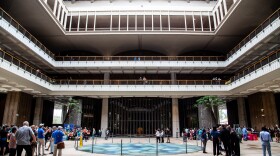The Fire Safety Research Institute compiled a list of 140 recommendations in its September report commissioned by Attorney General Anne Lopez.
This week, FSRI Program Manager Derek Alkonis presented the top 10 priorities that state House lawmakers should take away from the findings.
The top suggestion was to coordinate between several government agencies to prioritize current and future wildfire risks.
“The risk has been identified and well documented, but the investment into addressing the risk is not quite there,” Alkonis said.
“The recommendations are one and two ... making sure you have many people looking at this complex system to address what the needs will be. And then number two, which is to learn from states that are already further along, they're more mature in this process of experiencing these disasters, find out what they've done, and follow their lead."
"We don't want to reinvent the wheel," he said.
This echoes Hawaiʻi Wildfire Management Organization Executive Director Elizabeth Pickett's comments when the Phase 2 report was released this fall. She explained that when all the different agencies and departments recognize wildfire risk, the implementation of policy and investment can be more manageable.
"In a system where the culture shifts and everybody's alert and awake to the risk that we face and they're all doing their part, it doesn't seem so daunting. It just seems normal,” she said.
“In other places where they know they have fire risk. Of course, the codes have wildfire-related safety measures in them. Of course, land managers are managing their vegetation. Of course, there's funding put toward a state fire marshal's office. ... It is common and best practice for the whole system to be aware of fire and build it into what they do."
The second recommendation was to complete and install a state fire marshal. It’s a position that was approved by the Legislature this year. Whoever gets the job will assess fire risk, work with state and county partners, and enforce the state fire code.
Hawaiʻi is the only state in the country that does not have a fire marshal. The State Fire Council, comprised of all the county fire chiefs and state fire service representatives, finalized the job description for the position at the end of September. However, it has not yet been posted. There has been no information on the timeline for that position.
Alkonis was concerned that the funding for the State Fire Marshal Office would not be enough in comparison to others across the country. Hawaiʻi has budgeted $172,000 to fund the position, an assistant and training.
“That’s very light,” Alkonis said.
“Due to the wildfire risk not being identified or codified in laws, ordinances and policies, they have to start from scratch. ... There's other states that are already further along in that process and you can learn from them, but nonetheless this is going to be a very heavy lift," he said.
Lopez told lawmakers to consider temporarily putting the state fire marshal within the governor's office so they could have more administrative support.
"I don't believe that that amount is going to be sufficient to attract a state fire marshal who is competent to do the kind of work that's necessary here," Lopez said.
"It might be appropriate to have the fire marshal temporarily put into the governor's office and have that person supported by the governor's resiliency group ... could then provide that organizational administrative structure to the fire marshal."
The Fire Council is considering an 89-day temporary hire for the position, which does not require going through civil service selection procedures to speed up the process and help find qualified candidates who may be already retired, which can be an issue.
Other recommendations include improving communication systems, looking at better evacuation plans, vegetation management and refining fire weather detection systems.
The Phase 3 report, which was expected to be released by the end of this year, is now delayed until 2025. It is expected to have more detailed policy recommendations for lawmakers.
However, Lopez said her office hopes to have some of those recommendations available for lawmakers before the start of the next legislative session.
“We can't wait until this report is finished to start talking about what needs to change,” she said. “We're fully prepared to work with everybody on legislation for the upcoming session to implement things.”
The 2025 legislative session starts in January.







